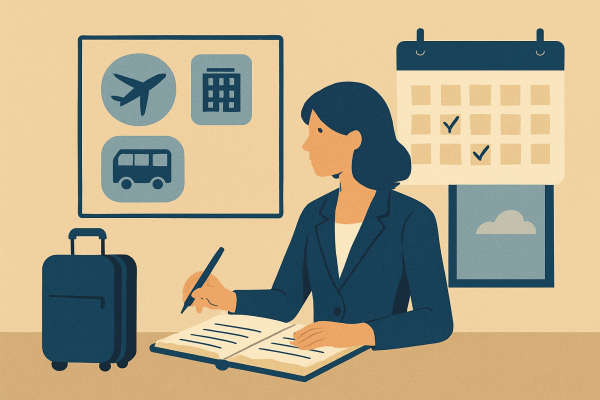Networking on the Go: Business Travel Tips for Building Connections
Unlock your career potential by mastering the art of networking on the go! In today’s digital world, valuable face-to-face interactions during business trips offer a unique edge. Discover how to leverage these opportunities to build stronger relationships, gain fresh perspectives, and expand your network’s reach. Learn how to prepare for effective networking, maximize opportunities at industry events, and maintain those crucial connections. Start building genuine, impactful professional relationships today – read on to learn how.
Important information
- Face-to-face interactions during business trips build stronger relationships than online exchanges, fostering trust and credibility.
- Business travel offers diverse networking environments, from industry conferences to informal gatherings, expanding your network’s reach and exposing you to new perspectives and markets.
- Preparing for networking is crucial: research events, set clear objectives (like identifying potential clients), craft a concise elevator pitch, and have business cards ready.
- Active listening, thoughtful questions, and understanding cultural norms are key to building genuine connections during in-person interactions.
- Maintain relationships after the trip by offering value (sharing resources, making introductions), sending personalized emails referencing past conversations, and connecting on professional platforms.
Understanding the Importance of Networking on the Go
Networking is crucial for career advancement, expanding your professional circle, and creating growth opportunities. Networking while traveling, particularly during business trips, offers unique advantages. Valuable face-to-face interactions are essential in our digital age. These in-person meetings foster stronger relationships than online exchanges. Business travel also facilitates networking in diverse environments, from industry conferences to informal gatherings, broadening your network’s reach and diversity. Moreover, travel exposes you to fresh perspectives and new markets, enriching your overall professional experience.
Benefits of Networking While Traveling
- Face-to-face interactions: creates stronger relationships than online exchanges.
- Diverse environments: facilitates networking in various settings, from industry conferences to informal gatherings.
- Expanded reach: broadens your network’s diversity and reach.
Impact on Professional Growth
- Fresh perspectives: exposes you to new ideas and viewpoints.
- New markets: provides insights into different markets and industries.
- Enriched experience: enhances your overall professional development.
How Business Travel Expands Your Professional Network
Business travel significantly expands your professional network by fostering valuable face-to-face interactions that build stronger relationships than virtual meetings. Attending industry events during these trips exposes you to a broader range of professionals, creating excellent platforms for exchanging ideas and forging valuable connections. Furthermore, the informal networking opportunities in relaxed settings, such as a casual dinner, can solidify these professional bonds. This blend of formal and informal networking makes business travel a powerful tool for career advancement.
Face-to-Face Interactions in a Digital Age
In-person meetings foster genuine connections that digital communication often misses. Face-to-face interactions enable a nuanced understanding through body language and emotional cues, building trust and credibility and leaving a lasting impact. The cultural exchange facilitated by business travel networking offers a significant advantage.
Preparation for Effective Networking During Business Travel
Before attending an event, familiarize yourself with the agenda, subjects covered, and attendees.
Establish clear objectives, such as identifying potential collaborators or customers, to maximize your interactions.
Craft a succinct elevator pitch to introduce yourself and your company effectively.
Carry a good supply of business cards for easy contact exchange.
Leverage social media and event apps to connect with attendees beforehand.
This facilitates pre-event networking and smoother introductions during the event itself.
Researching Event Details and Setting Clear Goals
Research the event’s schedule and attendee list to maximize your networking opportunities.
Setting clear goals, such as identifying potential clients or partners, is key to a focused approach.
Thorough preparation enables strategic connections with relevant people aligned with your business objectives, ultimately making your trip more productive.
Preparing Your Elevator Pitch and Business Cards
Make a strong first impression with a concise and compelling elevator pitch that highlights your key strengths. Create professional business cards with essential contact information to maximize networking opportunities during business trips. Tailor your pitch to resonate with different audiences. Focus on solutions for potential clients and emphasize resources when speaking to prospective partners. A well-designed business card reinforces your professional image and makes you more memorable.
For Clients
Focus on the solutions you offer. Highlight how your expertise can address their specific needs and challenges. Showcase successful projects and client testimonials to build trust and credibility.
For Partners
Emphasize your resources, network, and expertise. Explain how a partnership with you can be mutually beneficial. Demonstrate your value proposition and potential for synergistic collaboration.
Craft a concise and compelling elevator pitch that highlights your key strengths.
Create professional business cards displaying essential contact information.
Tailor your pitch to resonate with different audiences.
Leveraging Social Media and Event Apps
Connect with other attendees on platforms like LinkedIn, Twitter, and Facebook before, during, and after events. Event-specific apps can also enhance your networking. These apps often include attendee lists, messaging features, and interactive maps to help you navigate the event and maximize business trip opportunities. They can facilitate scheduling meetings with potential clients or partners.
Maximizing Networking Opportunities on Business Trips
Structured networking flourishes at industry events like trade shows and professional meetups, connecting professionals with shared interests and facilitating partnerships, client acquisition, and collaborations. Trade shows, in particular, showcase new products and services, attracting both buyers and vendors.
For a regional business perspective, local Chamber of Commerce mixers are invaluable.
Informal settings also provide rich networking opportunities. Coffee breaks, dinners, and social mixers allow for casual conversations that can develop into deeper connections, while shared meals foster camaraderie.
Co-working spaces and business lounges offer relaxed environments that encourage interaction, idea exchange, and organic networking.
Joining Industry Events, Trade Shows, and Professional Meetups
Enhance your business connections by attending industry events while traveling. Conferences, trade shows, and even local meetups provide invaluable opportunities to connect with potential clients and industry leaders, discovering innovative products and services. Trade shows are particularly effective for meeting vendors and buyers, while local meetups offer regional business insights. Use platforms like Meetup and Eventbrite to discover relevant events, prioritizing those aligned with your business objectives to maximize your networking potential. Here’s how you can maximize these opportunities:
Identify Key Events. Research and identify industry-specific conferences, trade shows, and local meetups relevant to your business. Look for events that attract your target audience and offer networking opportunities.
Plan Ahead. Register for events in advance to secure your spot and take advantage of early bird discounts. Prepare your travel arrangements, including flights, accommodation, and transportation to and from the event venue.
Set Clear Objectives. Define your goals for attending each event. Are you looking to generate leads, build brand awareness, or learn about new industry trends? Having clear objectives will help you focus your networking efforts.
Prepare Your Pitch. Craft a concise and compelling elevator pitch about your business and what you offer. Practice delivering it so you can confidently introduce yourself and engage in conversations with potential clients or partners.
Network Actively. Engage in conversations with attendees, exchange business cards, and follow up with promising contacts after the event. Use social media platforms like LinkedIn to connect with people you meet.
Utilizing Informal Settings for Networking
Informal settings on business trips, such as hotel lobbies, airport lounges, or social events, are excellent opportunities for relaxed networking. A simple observation, like someone’s book, a company logo, or even an overheard conversation snippet, can be a great icebreaker. Be prepared to briefly discuss your work and exchange contact information, as these casual encounters can often lead to valuable connections.
Coffee breaks, dinners, and social mixers also provide prime networking opportunities. Having a few conversation starters in mind can be helpful. Event apps can facilitate connections with other attendees, but remember that following up after the event is crucial for building lasting professional relationships.
Building Genuine Connections Through In-Person Interactions
Active listening is key to building strong relationships. Asking thoughtful questions demonstrates engagement and shows sincere interest, fostering trust and rapport, ultimately leading to stronger professional bonds. Understanding cultural norms not only improves communication but also shows respect, further strengthening connections. Mastering small talk, such as commenting on a shared event or experience, helps break the ice, creates a comfortable atmosphere, and encourages more meaningful discussions. Here’s how to improve these skills:
Practice active listening. Pay close attention to what others are saying, both verbally and nonverbally. Ask clarifying questions to ensure understanding and demonstrate genuine interest.
Ask meaningful questions. Go beyond superficial inquiries and ask questions that encourage deeper conversation and demonstrate your curiosity.
Be mindful of cultural norms. Different cultures have different communication styles. Be aware of these differences and adapt your approach accordingly to show respect and build rapport.
Embrace small talk. Use shared experiences or current events as conversation starters. Small talk can help build rapport and create a more comfortable atmosphere for deeper discussions.
The Significance of Active Listening and Engagement
Active listening demonstrates genuine interest and builds rapport, leading to more valuable interactions. Engaging actively by asking thoughtful questions and offering insightful contributions strengthens these connections. This approach fosters trust and mutual understanding, ultimately resulting in more meaningful networking and more productive experiences.
Mastering Small Talk and Conversation Starters
Finding common ground makes small talk easier. Connecting over shared interests and experiences helps introductions flow smoothly. Ask open-ended questions to encourage deeper conversations, demonstrating your interest and building rapport quickly. This also makes networking feel less forced. Here are some tips for effective small talk and networking:
Finding Common Ground
discovering shared interests eases initial interactions, making conversations flow more naturally. look for common ground by actively listening and observing cues from the other person.
Asking Engaging Questions
ask open-ended questions to encourage detailed responses and deeper conversation. this shows genuine interest and helps build connections faster.
Understanding Cultural Etiquette and Local Norms
Immersing yourself in local customs fosters respect and strengthens bonds. Learn appropriate greetings, table manners, and conversation starters. Even a few phrases in the local language can create a positive impression. This cultural awareness prevents misunderstandings and builds trust.
For instance, eye contact can be a sign of respect in one culture and a challenge in another. Gift-giving etiquette also varies significantly. Adapting to these nuances demonstrates sensitivity and improves communication, ultimately conveying respect.
Maintaining Relationships and Following Up
Cultivating meaningful relationships starts with providing value. Sharing insightful articles and helpful resources, along with making introductions, demonstrates genuine interest and positions you as a valuable connection, which fosters collaboration and reciprocity.
- Share insightful articles.
- Offer helpful resources.
- Make introductions.
Staying connected thrives on digital communication. Personalized emails, especially those referencing past conversations, are highly effective. Connecting on LinkedIn and other professional platforms, while regularly engaging with their content and sharing industry updates, keeps you top-of-mind. Remember not to overdo it.
- Send personalized emails.
- Reference past conversations in emails.
- Connect on professional platforms.
- Engage with their content.
- Share industry updates.
Offering Value and Expertise to New Connections
Sharing your expertise strengthens relationships. Offering helpful advice and resources, tailored to their specific needs, demonstrates genuine care for their success. Introducing them to valuable contacts further amplifies this support. A brief follow-up email expressing your pleasure in meeting and reiterating your willingness to assist solidifies the connection. Here’s how you can effectively share your expertise and build stronger relationships:
Offer tailored advice and resources. Providing helpful advice and resources demonstrates genuine care for their success. Consider their specific needs and offer relevant expertise.
Make valuable introductions. Connecting individuals with your network amplifies your support and opens doors to new opportunities. Introduce them to contacts who can be mutually beneficial.
Follow up with a thoughtful email. A brief follow-up email expressing your pleasure in meeting and reiterating your willingness to assist solidifies the connection. This reinforces your commitment and keeps the conversation going.
Utilizing Digital Communication for Continued Engagement
Digital tools are essential for maintaining connections. From emails and social media to video calls, consistent communication strengthens relationships and cultivates valuable, lasting connections. Sharing insightful articles or industry news keeps you at the forefront, while personalized messages, especially those referencing past conversations, demonstrate genuine interest. Moreover, these tools enable you to connect your contacts with each other, organically expanding your network. Regular check-ins also help maintain rapport until your next in-person meeting.



















